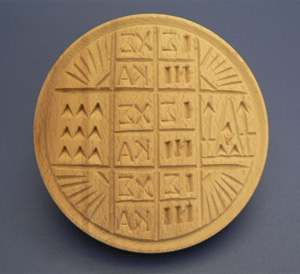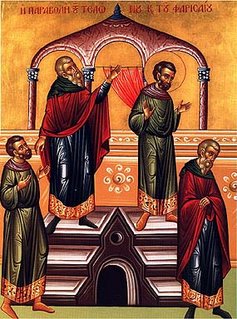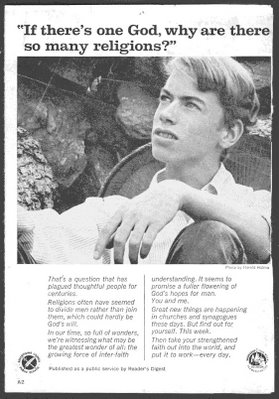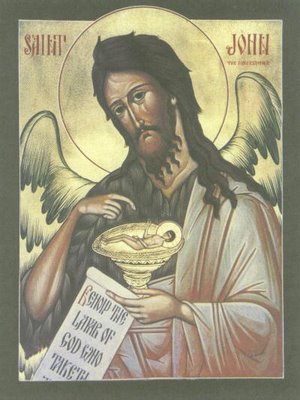 A sunny not too cold weekend in Portland, and after church services and a phone call to my friend, I hopped on my bicycle for the first time in six weeks, and headed down to visit Athanasios and Nektaria, about forty blocks away. I never wear a jacket when I bike. Just the thin cotton shirt I wore to church covered my skin, and my best cargos clad my bottom half. I'm not a sweaty person, especially on a chilly day. (By the way, the guy in the cartoon is NOT me!)
A sunny not too cold weekend in Portland, and after church services and a phone call to my friend, I hopped on my bicycle for the first time in six weeks, and headed down to visit Athanasios and Nektaria, about forty blocks away. I never wear a jacket when I bike. Just the thin cotton shirt I wore to church covered my skin, and my best cargos clad my bottom half. I'm not a sweaty person, especially on a chilly day. (By the way, the guy in the cartoon is NOT me!)The ride down Mount Tabor heading south was great, wind in my face. "On the way home, wind'll be at my back. Good!" I thought to myself. As I turned to head west the slope gradually softened. Sunny and brisk, the way I like it. I felt like I was flying (my favorite dream). Happy to be alive and away from my weekday cubicle, I sang as I glided gently downhill through the Clinton neighborhood, an old Jefferson Starship song…
 "Last electric Sunday morning,
"Last electric Sunday morning,waitin' in the park for the dawn,
listenin' to all the animals
in the park and in the city beyond,
flashin' with my lady,
sky turnin' black to blue,
she said, I got a surprise for you…
a child is comin',
a child is comin',
a child is comin' to you…"
I guess I was feeling young or something. After all, I am a 29 year old man trapped inside a 55 year old body. This weekend I saw a lot of babies, out in the world, and at church. I guess it made me feel like a young dad again, seeing all the young dads, and remembering how much fun it was to be young, poor, and in love.
In my exuberance I didn't notice that the wind was at my back on the way down.
 The visit with Athanasios and Nektaria was great. I always feel at home there. They already had company, but when I arrived, they all made me feel like I was the guest of honor. The fellowship flowed like wine. The life of the unearthly Triad that draws us into Itself through the holy Spirit impressed itself on us like the crosses that the seal stamps on the communion loaves. Living the mystery of divine brotherhood in unaffected, childlike simplicity. Psalm 133 realised.
The visit with Athanasios and Nektaria was great. I always feel at home there. They already had company, but when I arrived, they all made me feel like I was the guest of honor. The fellowship flowed like wine. The life of the unearthly Triad that draws us into Itself through the holy Spirit impressed itself on us like the crosses that the seal stamps on the communion loaves. Living the mystery of divine brotherhood in unaffected, childlike simplicity. Psalm 133 realised.Two hours passed, but I felt we had been together for two days. The evening was coming on, time to hit the trail home.
After a round of hugs, kisses and well wishes, I snapped on my helmet, hopped on my bicycle, and off I went on my eastward ride home. The two blocks north flew by in a flash. I turned the corner to head east and… whoa! nearly fell off my bike as a strong east wind gusted me first to a grinding halt, and then, buffeted me so my progress was slow, like riding your bike in a foot and a half of flood water. I down-shifted as low as safety permitted, and then braced myself in the now almost icy wind, to make the uphill journey in the unexpected head wind.
 Oh, that's right. The title of this ramble. You didn't think "uphill at 55" meant 55 miles per hour, did you? No, it's just about getting a 55 year old 6'1" frame weighing almost 200 pounds uphill, and in a winter head wind. Hey, but who's complaining? Though at times I had to just stop and stand there until my muscles would pump again, it was delicious to feel the icy wind blowing through my cotton shirt, and still feel the faint heat of the setting sun's final photons tenderizing the back of my neck.
Oh, that's right. The title of this ramble. You didn't think "uphill at 55" meant 55 miles per hour, did you? No, it's just about getting a 55 year old 6'1" frame weighing almost 200 pounds uphill, and in a winter head wind. Hey, but who's complaining? Though at times I had to just stop and stand there until my muscles would pump again, it was delicious to feel the icy wind blowing through my cotton shirt, and still feel the faint heat of the setting sun's final photons tenderizing the back of my neck.It's always the last leg of my bike rides that's the killer, though coming home from Athanasios' house is the easiest uphill of any of my usual rides. I've never had to walk my bike coming home from his place, though riding up to the top of Mount Tabor from almost any other direction, I have to hop off the bike, walk it for a few blocks, and then ride the last block or two, so "it looks good" to myself and the neighbors. Wouldn't want the neighbors to see me walking my bike home!
 The last leg, though, is the hardest. After I turned the corner to head north again, I noticed the headwind was mostly gone. The mountain is in the way. Still, my body was feeling like it was going to cramp up and roll me into a little ball like a frightened sow bug. So I stopped, looked up to the sky, and prayed, thanking the Lord for getting me this far and asking for strength for the final ascent. Two or three minutes was all, but when I hopped on, though it hurt and I was parched, I felt a second wind from the inside of me.
The last leg, though, is the hardest. After I turned the corner to head north again, I noticed the headwind was mostly gone. The mountain is in the way. Still, my body was feeling like it was going to cramp up and roll me into a little ball like a frightened sow bug. So I stopped, looked up to the sky, and prayed, thanking the Lord for getting me this far and asking for strength for the final ascent. Two or three minutes was all, but when I hopped on, though it hurt and I was parched, I felt a second wind from the inside of me.My mind separated from my body, which seemed to go on "automatic." My eyes focused on the cracks in the sidewalk (I was riding on the empty sidewalk now) like they used to when I was a small child and was made to walk further than I could bear, somewhere a counting was going on inside me like the voice of my Mom whispering, "we're almost there." My mind, to busy itself for the final few minutes of uphill challenge, began meditating.
"It's always easy to glide downhill, especially with the wind at your back. Anyone can do it. But how about the journey home? It's not easy, is it? Uphill is hard enough, but with the wind in your face! Hah! …People don't realise, when they think they're having a good time, when it's sunny, they're feeling on top of the world, they're in charge, young, beautiful, successful. They don't realise how easy it is to glide downhill, they're just enjoying it. Anyone can do it. Just join in the fun. But what happens when they have to get back?"
What was really at the back of my brain, stewing, was a matter that has nothing to do with my bike ride, except by analogy.
 On my way to see my friends, I was happy, looking forward to seeing them again, singing, because I was happily remembering those days of youth, poverty and love. Like when I first got back to Orthodoxy, to Holy Trinity. It was a community that was young, poor and in love, in love with the Lord, poor in spirit but rich in grace, young in the ways of the world. A mighty man of God, Elias Stephanopoulos, was the pastor. Men of the church did the upkeep of the grounds. We made our own candles, recycling the stubs, us men doing the heavy work of dipping, assisted by boys, them women doing the lighter work of cutting the candles off the frames and boxing them. We charged 25 cents per candle then. We did this two or three times a year. The fellowship was natural, real, unaffected. We did this out of love. The choir sang under a director who was from us, who labored without pay. Many women and men gave their time and talents, because treasure was scarce.
On my way to see my friends, I was happy, looking forward to seeing them again, singing, because I was happily remembering those days of youth, poverty and love. Like when I first got back to Orthodoxy, to Holy Trinity. It was a community that was young, poor and in love, in love with the Lord, poor in spirit but rich in grace, young in the ways of the world. A mighty man of God, Elias Stephanopoulos, was the pastor. Men of the church did the upkeep of the grounds. We made our own candles, recycling the stubs, us men doing the heavy work of dipping, assisted by boys, them women doing the lighter work of cutting the candles off the frames and boxing them. We charged 25 cents per candle then. We did this two or three times a year. The fellowship was natural, real, unaffected. We did this out of love. The choir sang under a director who was from us, who labored without pay. Many women and men gave their time and talents, because treasure was scarce. Since those days, we have caught the American virus of "growth is success." We have been taught that we value God as much as we're willing to write checks to church for. We've been enlightened by the superior model of "church as mystical business." The ride was so smooth we didn't realise we were heading downhill with the wind at our backs. At what many thought was the beginning of the height of our glory, the classical school (Agia Sophia Academy) which was to develop into the first Orthodox day school in Portland, and which was lodged in our facilities, is leaving us (after this semester) for a smaller, humbler congregation on the West side.
Since those days, we have caught the American virus of "growth is success." We have been taught that we value God as much as we're willing to write checks to church for. We've been enlightened by the superior model of "church as mystical business." The ride was so smooth we didn't realise we were heading downhill with the wind at our backs. At what many thought was the beginning of the height of our glory, the classical school (Agia Sophia Academy) which was to develop into the first Orthodox day school in Portland, and which was lodged in our facilities, is leaving us (after this semester) for a smaller, humbler congregation on the West side.Today we had a town hall meeting after church to talk about the prospect of Holy Trinity being raised to cathedral status. Mostly attended by the well-to-do, and mostly the well-to-do taking the open mic, we heard nothing but congratulation for us being selected for this honor.
 No mention of the fact that a real ministry, the day school, had fled the ship. Even one such sign should've been enough to make one think. Instead, a successful businessman and promotion man enthusiastically told us that he studied a lot of data and found that our congregation has done more, gives more, and is in all respects superior to most other churches that are already designated "cathedrals." He said with justifiable pride and enthusiasm that we are "worthy" of this distinction. Another person speaking at the open mic a few minutes earlier had remarked that it's too bad that none of the "rank and file" members were present so we could hear their views. Well, I'm rank and file, but I know better than to pipe up, because I am only a "mystic" and not a "skeksi".
No mention of the fact that a real ministry, the day school, had fled the ship. Even one such sign should've been enough to make one think. Instead, a successful businessman and promotion man enthusiastically told us that he studied a lot of data and found that our congregation has done more, gives more, and is in all respects superior to most other churches that are already designated "cathedrals." He said with justifiable pride and enthusiasm that we are "worthy" of this distinction. Another person speaking at the open mic a few minutes earlier had remarked that it's too bad that none of the "rank and file" members were present so we could hear their views. Well, I'm rank and file, but I know better than to pipe up, because I am only a "mystic" and not a "skeksi". My wife, however, as usual had the last word on the open mic, so there, one of the rank and file got her two bits in. For some reason I couldn't quite hear what she said, except for little quips of "Holy Spirit" this and that. She's a diehard supporter of anything that smacks of prosperity, especially if you tack the word "God" on to it. Appropriately, she got a round of applause, and then the whole meeting drew to a quick close. What they're going to do next, God knows, but He's not telling me. I guess I'm not worthy.
My wife, however, as usual had the last word on the open mic, so there, one of the rank and file got her two bits in. For some reason I couldn't quite hear what she said, except for little quips of "Holy Spirit" this and that. She's a diehard supporter of anything that smacks of prosperity, especially if you tack the word "God" on to it. Appropriately, she got a round of applause, and then the whole meeting drew to a quick close. What they're going to do next, God knows, but He's not telling me. I guess I'm not worthy.Funny that all this should take place on the Sunday of the Publican and the Pharisee. "Whoever exalts himself will be humbled, and whoever humbles himself will be exalted." I suppose the saying's true only within the context of the Divine Liturgy, but when you're back out in the "real" world…
If you've made it to the end of my worthless ramble, bravo! but now, PLEASE, turn off the computer and go read your Bible!







